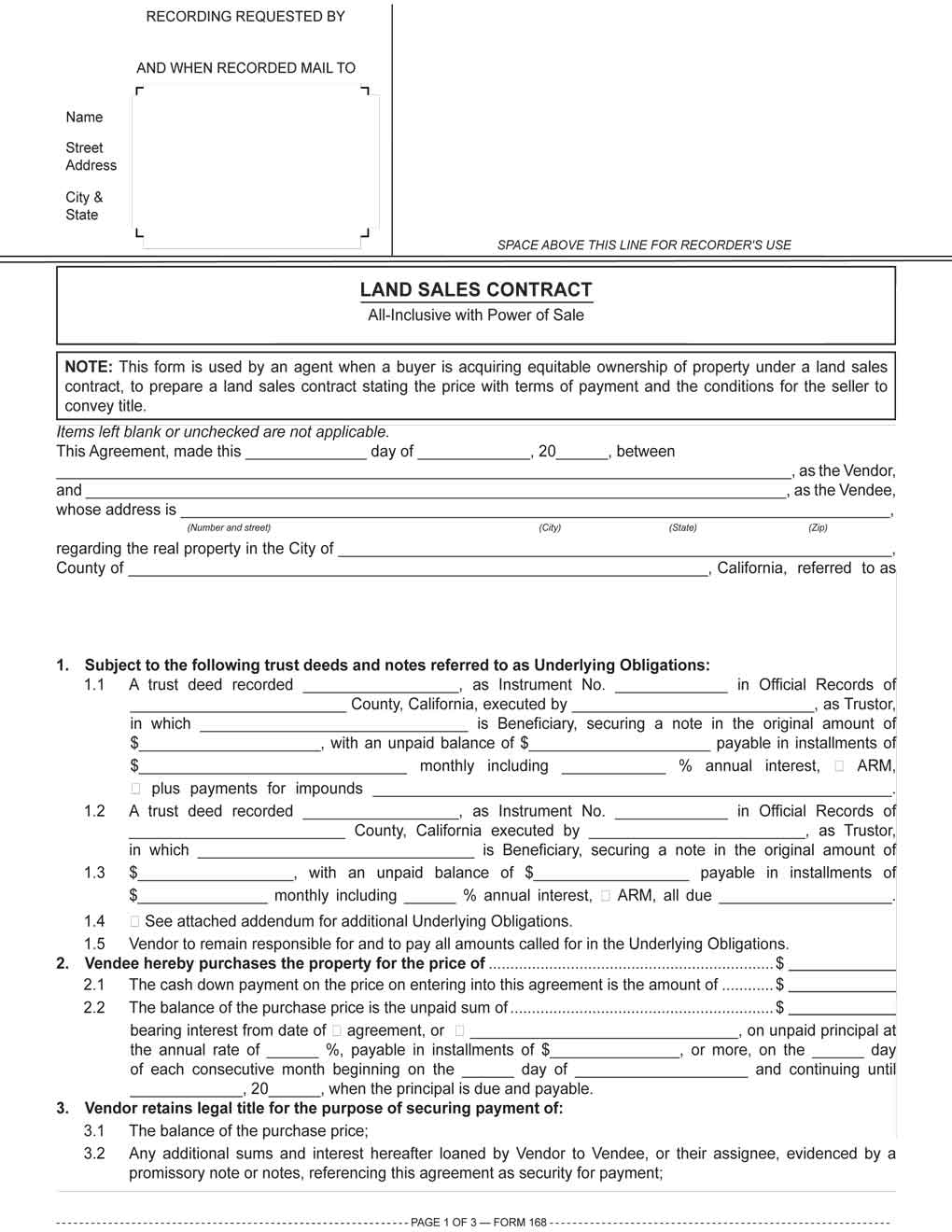This form is used by an agent when a buyer is acquiring equitable ownership of property under a land sales contract, to prepare a land sales contract stating the price with terms of payment and the conditions for the seller to convey title.
Masking the sale
When an agent uses a land sales contract, it becomes a full — though improper — substitute for escrow’s use of a grant deed, note and trust deed. [See RPI Form 404, 420 and 450]
Thus, the new owner/buyer on taking occupancy does not become the vested owner of record. Instead, the seller retains title as security for payment under the land sales contract.
With a land sales contract, a buyer (referred to as a vendee) and seller (referred to as a vendor) enter into an agreement for the sale of property with the price payable on credit terms.
Here, the buyer takes possession of the property and makes payments called for in the agreement. In most instances, the transaction lacks a formal escrow, title insurance and the numerous seller mandated disclosures of property conditions and seller financing. [See RPI Form 300 and 300-1]
Vested title does not pass to the buyer by grant deed until the buyer pays the seller in full, satisfying the buyer’s obligation under the land sales contract.
However, when a seller enters into a land sales contract, an equitable conversion of ownership occurs legally altering the seller’s vested ownership to that of a lien on the buyer’s ownership interest in the property. The buyer’s occupancy gives public notice of the conversion, though the public record typically does not reflect the existence of the land sales contract.
From the moment of entry into the contract and the passing of possession to the buyer, the seller is only entitled to receive money, but not a return of the property on a default except by foreclosure. Thus, by the conversion, the buyer becomes the equitable owner of the real estate with the right of redemption to pay all sums due the seller and receive title as the legal owner.
No right of reinstatement for delinquent payments exists for the buyer under a land sales contract, just redemption by full payoff of the debt owed. [Tucker v. Lassen Savings and Loan Association (1974) 12 C3d 629]
However, as straight-forward as the land sales contract may sound, in practice it has proven to be an extremely fragile financial and legal affair for all involved.
Buyer benefits lost
As part of the process under a land sales contract, the buyer often fails to exercise their full benefits of ownership, such as:
- interest (and possibly depreciation) deductions;
- the right to further encumber or otherwise use the equity in their property; and
- property tax homeowner/veteran exemptions.
Further, hiding the sale from the mortgage holder means hiding it from everyone, including:
- the Internal Revenue Service (IRS);
- the Franchise Tax Board (FTB);
- the local property assessor and tax collector; and
- creditors.
Other disadvantages exist for buyers who use land sales contracts in lieu of a grant deed, note and trust deed.
These negative results include the failure to record the documents used and consequently the loss of the benefit extended to recorded transactions as well as the lack of title insurance to defend the buyer’s ownership.
At the very least, a carryback transaction which is intended to be unescrowed, unrecorded and uninsured needs proper documents — a grant deed, note and trust deed as opposed to a land sales contract — to avoid compounding the failure to record and obtain a title insurance policy.
Land sales contract foreclosure
When a buyer defaults on payments under a land sales contract containing a non-judicial (trustee’s) foreclosure provision, the seller needs to serve the defaulting buyer with a notice of default (NOD) and a debt acceleration notice.
California land sales contracts without a non-judicial foreclosure provision need to follow strict judicial foreclosure processes that give defaulting homebuyers time to pay the balance of the price yet unpaid.
However, when the buyer does not timely satisfy the entire debt after commencement of a judicial foreclosure sale, the seller (or highest bidder) becomes the owner of the property.
In California, land sales contracts may be foreclosed non-judicially, involving a trustee and not the courts. Further, in either method of foreclosure, the seller may not pursue the buyer to collect any loss due to a deficiency in the value of the secured property. [See RPI e-book Creating Carryback Financing, Chapter 24]
Further, to foreclose a defaulting buyer under a land sales contract, a power-of-sale clause needs to be included in the contract authorizing non-judicial foreclosure. Also, without the power-of-sale clause, the seller may act on a forfeiture of the contract against a defaulting buyer. [See RPI Form 168 §15]
In land sales contract foreclosure under the power-of-sale provision, a defaulting buyer may bring all delinquencies current to keep their property. Although California allows land sales contract forfeiture, a defaulting buyer may file a court action and force the seller to foreclose judicially, or simply recover the dollar amount of the equity lost in the forfeiture activity of the seller.
Thus, a defaulting buyer who has built up substantial equity under a land sales contract without a power-of-sale provision has an unconditional right to complete the purchase by paying the entire remaining balance, a redemption.
However, the buyer has no right to reinstate on a default, unless the contract includes terms for a reinstatement or a trustee’s power-of-sale provision (which automatically permits the rights of reinstatement and redemption). [Petersen v. Hartell (1985) 40 C3d 102]
Analyzing the Land Sales Contract
An agent uses the Land Sales Contract — All-Inclusive with Power of Sale published by RPI (Realty Publications, Inc.) when a buyer is acquiring equitable ownership of property under a land sales contract. The form allows the agent to prepare a land sales contract stating the price with terms of payment and the conditions for the seller to convey title. [See RPI Form 168]
The land sales contract contains provisions covering:
- the terms of the underlying obligations recorded against the property [See RPI Form 168 §1];
- the terms of the sale, including the purchase price, down payment and the payment of the balance of the purchase price under the land sales contract [See RPI Form 168 §2]; and
- the condition that legal title does not formally pass to the buyer by grant deed until the buyer pays the seller in full. [See RPI Form 168 §3]
Further, the buyer agrees to:
- keep the property in good condition and repair and not commit waste [See RPI Form 168 §4];
- continuously maintain hazard insurance covering hazards for which the seller requires insurance [See RPI Form 168 §5];
- defend any action or proceeding purporting to affect the security or the rights and powers of the seller [See RPI Form 168 §6];
- pay all taxes and assessments affecting the property at least 10 days before delinquency [See RPI Form 168 §7]; and
- permit the seller to perform any act provided for in the contact to the extent necessary to protect the security. [See RPI Form 168 §8];
Both the seller and buyer mutually agree:
- the seller will receive any award of damages resulting from injury to the property or condemnation [See RPI Form 168 §9];
- by accepting the payment of any sum after its due date, the seller does not waive their right to either require prompt payment when due of all sums or to declare default for the buyer’s failure to pay [See RPI Form 168 §10];
- the seller will convey title free of creditor’s liens, subject to existing conditions, covenants and restrictions (CC&Rs), to the buyer when they pay all sums due to the seller under this agreement [See RPI Form 168 §11];
- the seller may declare all sums immediately due and payable when the buyer sells, transfers or conveys any interest in the property [See RPI Form 168 §12];
- the buyer transfers to the seller all the rights, title and interest in rents generated by the property to be applied to the obligations secured by this agreement [See RPI Form 168 §13];
- when payment of any indebtedness or performance of this agreement is in default, the seller may declare all sums secured immediately due and payable by:
- commencing suit for their recovery by foreclosure of this lien; or
- delivering to the trustee a written notice declaring default with demand for sale [See RPI Form 168 §14];
- on a default under any obligation of this agreement and acceleration of all sums due, the seller may initiate a non-judicial foreclosure [See RPI Form 168 §15];
- when requested by the buyer, any principal paid in addition to regular installments will be paid by the seller to holders of the underlying obligations for a reduction in the principal. When the holders of underlying obligations are entitled to a prepayment penalty, the buyer is to pay the amount to the seller for payment of the penalty [See RPI Form 168 §16];
- when the seller defaults in their performance under this agreement, the buyer may cure the default and credit the payments against the principal and interest [See RPI Form 168 §17];
- the agreement is binding against all successors, assigns and pledgees [See RPI Form 168 §18];
- when the property is occupied by a tenant, within 10 days of the buyer’s receipt of a written request by the seller, the buyer is to execute a written estoppel containing a summary of the financial and possessory terms of the tenant’s lease agreement and whether the tenant has performed their obligations [See RPI Form 168 §19; see RPI Form 598];
- the seller is to give written notice to the buyer regarding any final/balloon payment at least 90 and not more than 150 days before any balloon payment is due, a statutory requirement [See RPI Form 168 §20];
- whether additional addenda will be part of the agreement, such as an owner-occupancy rider [See RPI Form 168 §21; see RPI Form 202-3]; and
- in any action to enforce this agreement, the prevailing party is to receive attorney fees. [See RPI Form 168 §22]
The vendor and vendee then sign the form and a notary public verifies their identities.
Form navigation page published 07-2017.
Form last revised 04-2024 to include the mandatory appraisal notice.
Form-of-the-Week: Offer for Land Sales Contract and Land Sales Contract — All-Inclusive with Power of Sale — Forms 167 and 168
Word-of-the-Week: Land Sales Contract
Brokerage Reminder: Carryback financing — securing alternatives for buyers and sellers
Blog: Spill-over from rising interest rates impacts carryback arrangements
Article: Land sales contracts pose old risks to new buyers
Article: Land sales contracts are duping homebuyers
Book: Creating Carryback Financing, Chapter 24: Alternative security devices for sellers
Client Q&A: What is seller carryback financing and what are its benefits?
Video: The Note and Trust Deed Work Together
Video: Repayment Variations: Graduated Payment Mortgage and All-Inclusive Trust Deed









